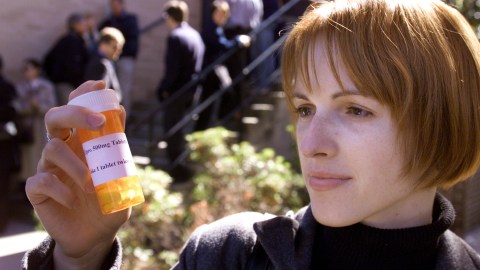Medical Experts Are Debating Whether or Not You Should Finish a Course of Antibiotics

One of the most common instructions a physician or pharmacist will give you is to finish all of the medication in an antibiotic prescription. Not doing so, it’s thought, could lead to dangerous mutations. The idea is that the longer an antibiotic stays in the body, the more likely all the bacteria will be killed, leaving none behind to mutate and become resistant. It’s widely believed that not finishing a course of antibiotics may lead to treatment-resistant diseases or “superbugs.”
Consider antibiotic-resistant gonorrhea, a growing concern for world health officials. This is especially due to the historic rise of STIs in most developed countries. If left uncured, gonorrhea can lead to complications, including infertility. The CDC reported nearly 400,000 gonorrhea cases in 2015, a record high. This is the regular kind. And the trend continues upward. The thing is, every time a new class of antibiotics is introduced to gonorrhea, it changes. The bacteria mutates and evolves with every interaction. So does taking all your meds prevent this or encourage treatment-resistance?

Treatment-resistant bacteria is on the rise, and there’s debate over what’s causing it. Getty Images.
Some medical experts are now questioning the idea of finishing a course of antibiotics. Their argument was published recently in the British Medical Journal. The piece was entitled, “The Antibiotic Course Has Had Its Day.” In it, the authors state that there is “…little evidence that failing to complete a prescribed antibiotic course contributes to antibiotic resistance.” From this viewpoint, taking the medication after you already feel better may not avoid antibiotic resistance, but encourage it.
How so? The authors argue that the more exposure the bacteria has to the antibiotic, the more likely it is to become resistant. This is true both in terms of a human population as well as on the individual level.
Prof. Martin Llewelyn BSc, FRCP, DTMH, PhD, and nine other British colleagues authored the study. Dr. Llewelyn hails from Brighton and Sussex Medical School. In the study, he and fellow authors write, “The idea that stopping antibiotic treatment early encourages antibiotic resistance is not supported by evidence, while taking antibiotics for longer than necessary increases the risk of resistance.”
Meanwhile, secondary school curriculum and public health groups advocate for finishing a course of antibiotics in the US, the UK, Australia, Canada, and many other places. This study instead urges a pivot toward taking medication “exactly as prescribed.” Some medical professionals fear an alteration of this magnitude telegraphs to some patients that they may take medications any way they see fit, instead of as instructed by a physician.

Should courses of treatment be the same or more personalized? Getty Images.
The study claims that fear of resistance started in the 1940s. Alexander Fleming, the discoverer of penicillin, warned patients to take enough of it when prescribed for Strep throat (Streptococcus pyogenes). He was afraid that if not enough was used, the bacteria could mutate in the throat and be passed along, causing an incurable epidemic. But according to study authors, this particular bacteria has never become resistant to penicillin, even now decades later.
Dr. Llewelyn and colleagues suggests this fear of undertreatment was carried forth, leading to a historic tendency toward overtreatment. The authors say that, “There is…little evidence that currently recommended durations are minimums.” New drug treatment courses are based on older ones, even if these new ones have different pharmacological properties, the authors’ state.
Some drug studies, including a number focused on a class of drugs called quinolones, have been shown effective at shorter durations that their recommended ones. Another issue is that people’s bodies respond differently to different drugs. Instead of a one-size-fits-all approach, this study suggests using “biomarkers of treatment response” to determine the course of treatment. Whether it’s a mild or raging infection may affect dosage and course as well.

Have we historically been overtreating bacterial infections? Getty Images.
In Dr. Fleming’s defense, he also warned the public and medical establishment against using antibiotics for diseases that weren’t bacterial, which he said could also lead to resistance. Another way to interpret this is not using them outside of how they’re supposed to be used, to fight human disease. Use of antibiotics in the meat industry, for instance, has been fingered as a possible culprit in the upswing in treatment-resistant cases.
Besides much more research to determine appropriate courses for antibiotics, researchers claim that an evidence-based message should be composed, “…such as stop when you feel better.” Microbiologist Lance Price, director of the Antibiotic Resistance Action Center at The George Washington University, worries about this last part. He told Scientific American that, although he agreed that more research is needed, he called removing the current public health message before a more accurate one was ready, “totally irresponsible.”
Of course, there needs to be balance, since too little treatment could cause a resurgence of infection, while too much could lead to future drug-resistance. Knowing this, what should you do if you’re prescribed antibiotics? Listen to your physician’s advice, read up on your medication, and ask your doctor or pharmacist questions.
To learn about a worrisome, little talked about drug-resistant pathogen, watch this video:





